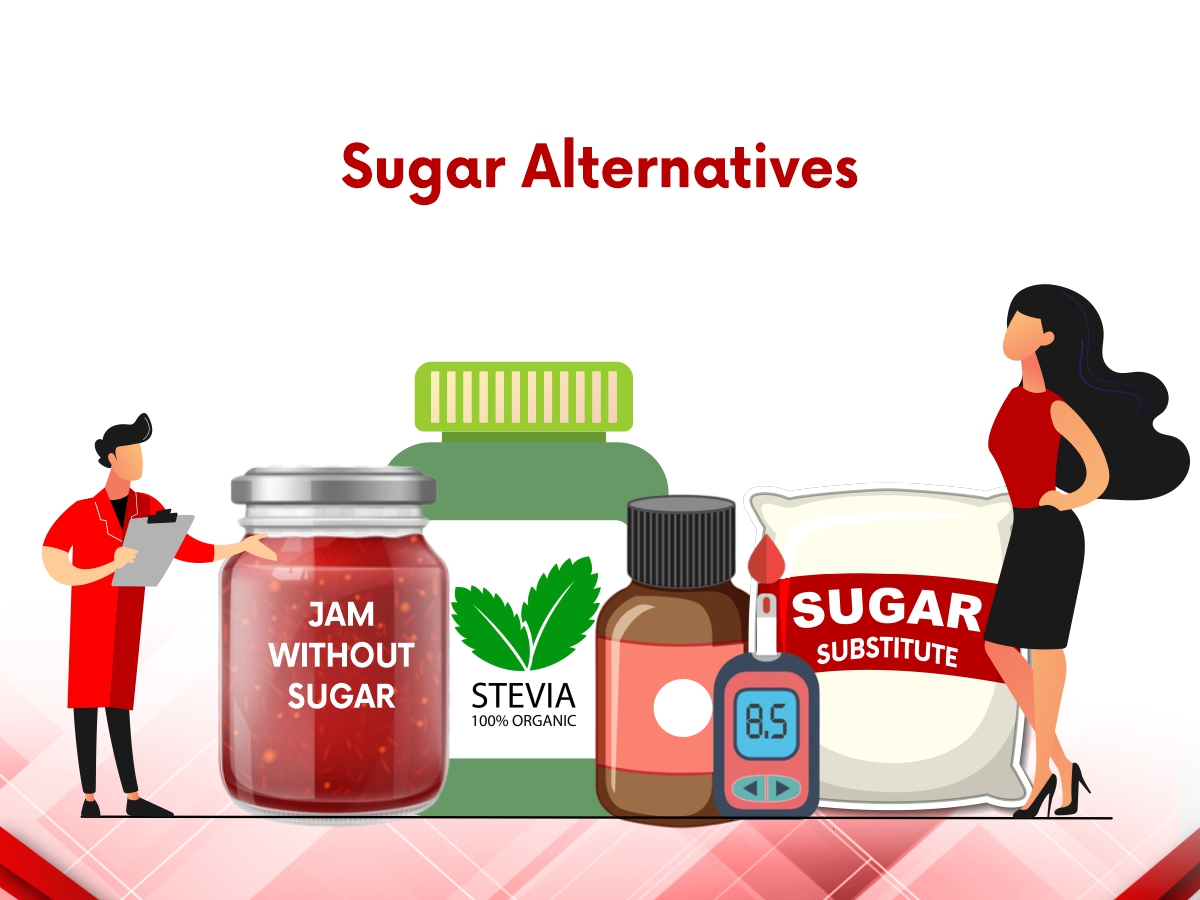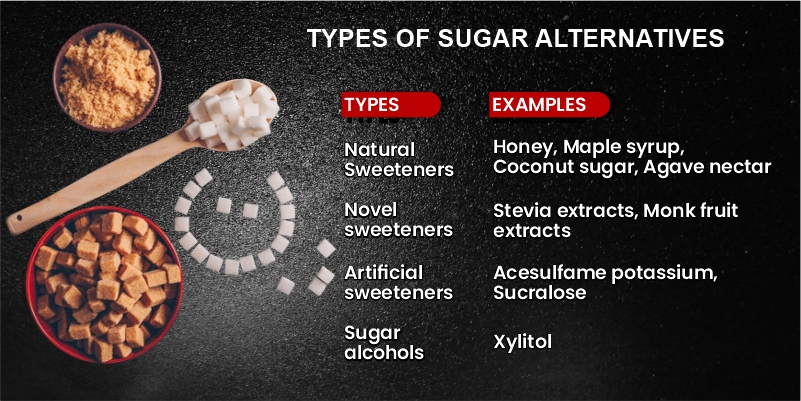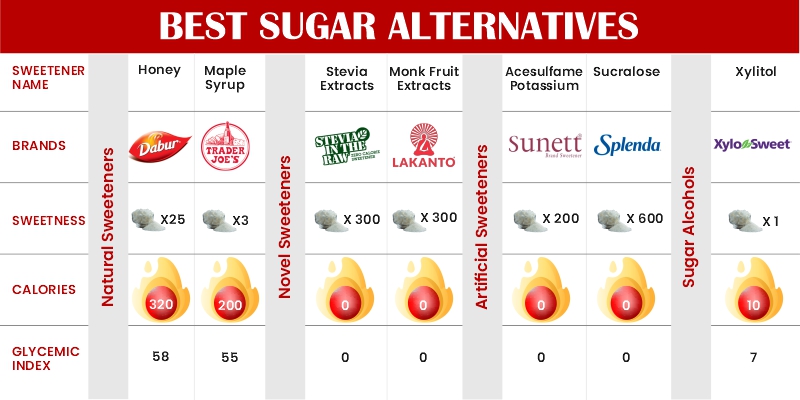
Close


Is sugar a dietary weakness for you? A lot of people crave it. However, it can be difficult to completely cut out sugar even if you don’t particularly have a sweet tooth. Nearly everything has sugar added to it – from all processed meals to soda and other sugary beverages.
Sugar gained a resentful name with regard to health.
Fortunately, a variety of natural and artificial sweeteners and sugar replacements are commonly available to assist in lowering the quantity of table sugar in the diet.
At a CAGR of 7.20% over the forecast period, it is expected that the global market for sugar alternatives would increase from $7.91 billion in 2022 to $12.86 billion in 2029.
Food’s flavour is preserved, sweetened, and enhanced with sugar. Because of this, it might be challenging to avoid and resist, but cutting back on sugar has several advantages for your health.
A high-sugar diet has been linked to a variety of illnesses, either directly through its impact on the body or indirectly through the consequences of obesity. Obesity, type 2 diabetes, and heart disease can all be caused by excessive sugar intake. High sugar intake is linked to poor nutrient absorption, elevated triglyceride levels, and tooth decay. Additionally, it has been connected to cognitive dysfunction, which affects memory and raises the risk of dementia.
A sugar substitute is a food additive that mimics the taste of sugar but typically has fewer calories.
Although they don’t contain sugar, sugar substitutes have a sweet flavour. It is roughly 200 times sweeter than sugar.
They have fewer calories than sugar, and some of them are even devoid of any. Foods with the labels “sugar-free,” “keto,” “low carb,” or “diet” frequently contain sugar substitutes.

Depending on your goals, each could have possible advantages and disadvantages.
Choosing the best sugar substitute for you…
Firstly, evaluate your reasons for cutting back on sugar.
If you have diabetes, artificial sweeteners or sugar alcohols, such as xylitol, may be a better option if consumed in moderation. Even natural sweets like honey can raise blood sugar. If you’re uncertain about what is best for you, always speak with a doctor or dietician.
Sugar substitutes—are they a wiser choice?
Depending on the sweetener you use, how much you use, and why, you can determine whether sugar alternatives are a healthier option for you.

Honey has a higher nutritional content than table sugar, including minerals, antioxidants, and vitamins. Additionally, it enhances gut health and is easier to digest than table sugar. The fact that honey has a lot of calories and breaks down into glucose and fructose means that, when ingested in excess, it has some of the same health risks as table sugar.
Top Brands:
Barkman Honey LLC, Bee Maid Honey Limited, Beeyond the Hive, Capilano Honey Ltd., Dabur India Ltd, Patanjali Ayurved Limited
Maple syrup is high in antioxidants in addition to being a good source of calcium, potassium, iron, zinc, and manganese. However, maple syrup has a high-calorie content and should only be consumed in moderation, like other natural sweeteners.
Top Brands:
Crown Maple Syrup, Butternut Mountain Farm Organic Maple Syrup, Spring Tree Organic Pure Maple Syrup, Field Day Organic Maple Syrup, Trader Joe’s Maple Syrup
Since coconut sugar is often never refined, it retains all of its vitamins and minerals and doesn’t affect blood sugar levels. While still high in fructose and carbs, coconut sugar has the same amount of calories as table sugar. People who want to reduce weight should therefore limit it. Additionally, coconut sugar can be a poor choice for diabetic people.
Top Brands:
BetterBody Foods, Wholesome Sweeteners, Madhava, Terrasoul Superfoods, Food to Live
Agave nectar provides more additional nutrients than regular sugar, but fewer than honey. Since it has a strong flavour, you might not need to use it as much. However, it has a lot of calories and fructose, both of which can contribute to obesity if consumed in excess. For those who have diabetes, agave nectar might not be a wise choice.
Top Brands:
Blue Green Agave, NOW Foods, Madhava, Tres Agaves, Agave in the Raw
Stevia is a plant extract with very little or no calories. Additionally, because it is sweeter than sugar, less of it is required to get the same level of sweetness. Due to its extremely low caloric value, stevia extract is regarded as a healthy sugar substitute for people with diabetes or who need to manage their weight.
Top Brands:
NOW Foods, SweetLeaf, Pyure Organic, Stevia In the Raw
If you’re trying to cut back on calories, monk fruit can be a good sugar substitute to give a try. Since monk fruit extract is 250–300 times sweeter than sugar, you don’t need to use much of it. In addition, the FDA (U.S. Food and Drug Administration) describes it as a sweetener that has no calories and no sugar, as well as no negative side effects. However, all commercially available monk fruit extracts have undergone some processing and can include additional sugars or sweeteners, one should always check the label carefully.
Top Brands:
It’s Just – 100% Monkfruit Extract Powder, Smart 138 Monk Drops, Purisure Monk Fruit Extract, NOW Foods Monk Fruit Liquid Organic, Lakanto Monkfruit Sweetener
Acesulfame potassium (Ace-K) is an artificial sweetener that doesn’t raise blood sugar levels, promote tooth decay, or add calories. Additionally, Ace-K is heat-stable. It can therefore be used in baking and cooking.
Top Brands:
Sunett®, Sweet One
Sucralose is a zero-calorie sweetener that is approximately 600 times sweeter than sugar. The FDA has authorised it as a safe sugar substitute for those striving to reduce calories, those with diabetes, and those women who are pregnant or breastfeeding.
Top Brand:
Splenda
Low-calorie sweeteners like xylitol, sorbitol, and other sugar alcohols are often 25% to 100% as sweet as sugar. Sugar alcohols don’t increase blood sugar suddenly or cause tooth decay, therefore they might be an excellent choice for diabetics. However, when ingested in excessive quantities, xylitol, like all sugar alcohols, may have a laxative effect and cause diarrhoea and bloating.
Top Brands:
XyloSweet, Ideal, PolySweet
The use of sugar substitutes is a topic that health professionals have debated for years. According to some, the use of sugar replacements is still questionable. However, the scientific community and FDA agree that their usage is safe, particularly when done in moderation.
Please Subscribe our news letter and get update.
© Copyright 2023 – Wissen Research All Rights Reserved.
Powered by VintageCoders